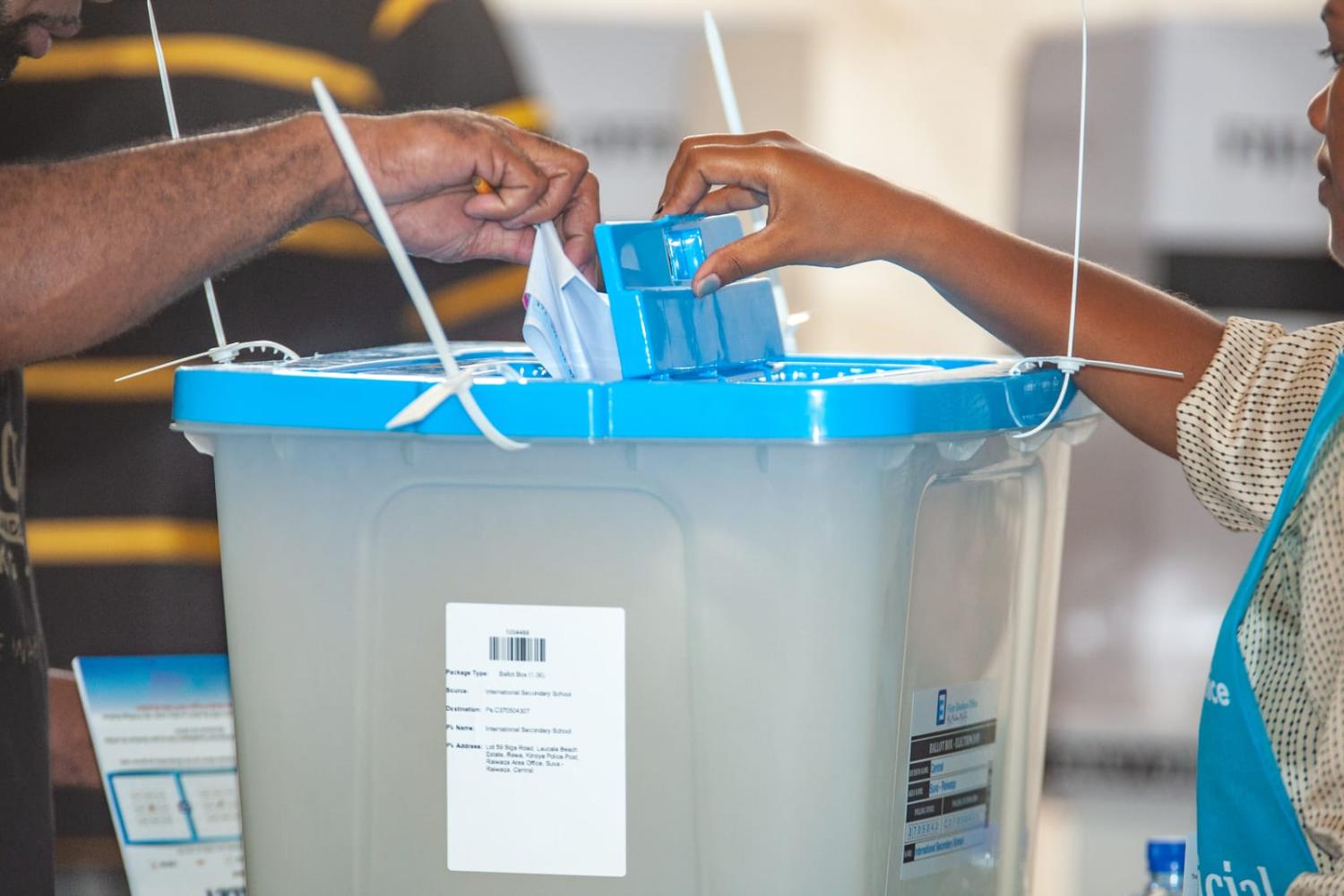The most recent Fijian election, held in December 2022, was hailed as a milestone in the Pacific Island country’s democratic journey – yet this has come at a price, with the number of women in parliament halved to just five out of 55 representatives.
With the slogan of “Let Love Shine”, the appointment of a coalition government led by Sitiveni Rabuka – a former prime minister, coup leader and military commander – has heralded a new era of politics after 16 years of autocratic rule by Frank Bainimarama, the architect of the 2006 coup, promising to get rid of controversial laws that restricted basic freedoms.
Yet the election also saw a steep decrease in women representatives, with the number of women in the Fiji Parliament dropping from ten out of 51 MPs (19.6%) to six out of 55 (10.9%). With the subsequent resignation of Rosy Akbar from the former ruling party FijiFirst, women’s representation has dropped to less than ten per cent. The number of women contesting the election (55) was slightly lower than in 2018, despite a significant rise in the number of men candidates (from 178 to 288). This suggests growing disengagement among aspiring women politicians.
The paradox is that the setback in women’s representation has happened despite concerted efforts to widen the space available for women in politics. Over the years, the women's movement in Fiji has ramped up its public advocacy campaigns to encourage more women to exercise their right to vote and run for office. The Fiji Women's Forum was established in 2012 by a coalition of women’s organisations to promote the goal of increased women’s political participation.
Women are also seemingly well-represented in senior party positions across Fiji’s political landscape. In 2022, both Unity Fiji Party and FijiFirst had women party presidents; the National Federation Party had Seini Nabou as its General Secretary, Lenora Qereqeretabua and Kamala Lajendra as two of the six national vice presidents and Anshu Lata as their Assistant General Secretary; the People’s Alliance Party had Lynda Tabuya as one of its four deputy party leaders; and the Fiji Labour Party had Taina Rokotabua as its Assistant Secretary General. This clearly does make a difference: the two highest-performing women candidates in the election – Tabuya and Qereqeretabua – both hold leadership positions in their parties.
Yet women are still under-represented as parliamentarians, and part of the issue may lie with the electoral system. Under Fiji’s open-list proportional representation (PR) system, electors cast a vote for an individual candidate, and party candidates’ personal vote shares are then pooled to determine the number of seats the party has won. In previous elections, a “coattails” effect has been observed, with women (and men) candidates coming into parliament on the back of a strong vote share by the party leader, despite small personal vote shares themselves.
In 2022, the major party leaders – Bainimarama and Rabuka – dominated the vote share again, but this did not translate into access for women candidates. With a more fragmented result than previous elections and an increase in the number of parties winning seats in parliament, the opportunities for women appeared to decrease. This highlights the open-list PR system’s lack of safeguards for gender diversity.
The decline in women’s political representation has significant implications for Fiji’s fragile democracy. It highlights the enduring power of Fiji’s masculinised political system – exemplified by the election itself, with the two major party leaders both male ex-military commanders and instigators of coups. In his inaugural speech, the Speaker of Fiji’s Parliament highlighted the male dominance of Fiji’s political sphere:
Whilst we have many new and young Members entering Parliament for the first time, I also notice the reduction of the number of women representatives … I sincerely hope that this is an important challenge that we as decision-makers and as a nation can collectively strive to rectify. But I must acknowledge the efforts of these six brave women who have successfully made it to a space that is always dominated by men. We must also pay all due respect to all the courageous women who had put up their hands to be candidates but were unable to join their colleagues in Parliament.
There is urgent and important work to be done to increase the number of women standing for, and being elected to, parliament. The decline in women’s political representation suggests a democratic deficit that complicates the story of Fiji’s 2022 election. Now that Fiji’s coalition government has assumed office and is promising a new era of politics, ensuring that women's rights are fully integrated into the transitional institutions and reforms being implemented is more important than ever. Equal rights for women cannot be an afterthought but rather should be an integral component of these new beginnings.

